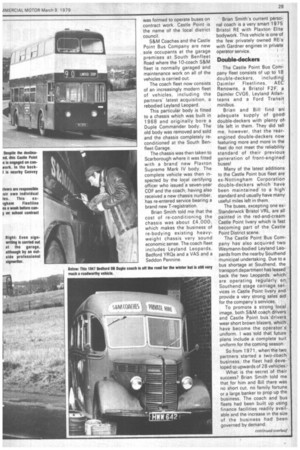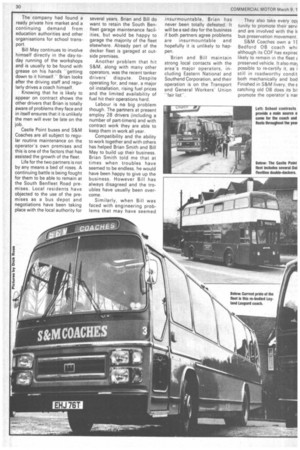Room to expand in coach trade
Page 30

Page 31

Page 32

If you've noticed an error in this article please click here to report it so we can fix it.
Noel Millier visits S&V Coacnes of nuncersley, Essex,. and finds there's room for high flyers
BACK IN 1970 Brian Smith and Bill May were busy working as fitters for a large road tank operation in Essex. Brian, who had previously served his apprenticeship with Eastern National, still had a bent towards the bus and coach industry and still held a psv driving licence. Together with his friend and colleague, Bill May, he decided to go into business.
In 1971 S&M Coaches of Thundersley, Essex was founded with two coaches. Pride of the fleet then was a Bedford VAL. The two partners tendered for school contract work and staff transfer work for the large installations on nearby Canvey Island.
It soon became apparent that, although there were 21 other operators in the Southend area, the new company had scope for expansion. In 1 973 S&M Coaches joined forces with a bus dealer and took over a vehicle repair garage. Here S&M Coaches have good workshop facilities. Four vehicles can be worked on under cover and even complete vehicle resprays can be carried out on the premises.
With the contract side of the business developing fast, the partners decided to create separate identities for the private hire and contract sides of the business. S&M Coaches continued to be an expanding operation of luxury coaches and the Castle Point Bus Company was formed to operate buses on contract work. Castle Point is the name of the local district council.
S&M Coaches and the Castle Point Bus Company are new sole occupants at the garage premises at South Benfleet Road where the 10-coach S&M fleet is normally garaged and maintenance work on all of the vehicles is carried out.
The coach fleet now consists of an increasingly modern fleet of vehicles, including the partners' latest acquisition, a rebodied Leyland Leopard.
This particular body is fitted to a chassis which was built in 1968 and originally bore a Duple Commander body. The old body was removed and sold and the chassis completely reconditioned at the South Benfleet Garage.
The chassis was then taken to Scarborough where it was fitted with a brand new Plaxton Supreme Mark IV body. The complete vehicle was then inspected by the local certifying officer who issued a seven-year COF and the coach, having also received a new chassis number, has re-entered service bearing a brand new 1-registration.
Brian Smith told me that the cost of re-conditioning the chassis was about £4,000, which makes the business of re-bodying existing heavyweight chassis very sound economic sense. The coach fleet includes Leyland Leopards, Bedford YRQs and a VAS and a Seddon Pennine. Brian Smith's current personal coach is a very smart 1975 Bristol RE with Plaxton Elite bodywork. This vehicle is one of the few privately owned RE's with Gardner engines in private operator service.
Double-deckers
The Castle Point Bus Company fleet consists of up to 18 double-deckers, including Daimler Fleetlines, AEC Renowns, a Bristol F2F, a Daimler CVG6, Leyland Atlanteens and a Ford Transit minibus.
Brian and Bill find an adequate supply of good, double-deckers with plenty of life left in them. They did tell me, however, that the rearengined double-deckers now featuring more and more in the fleet do not meet the reliability standard of their previous generation of front-engined buses!
Many of the latest additions to the Castle Point bus fleet are ex-Nottingham Corporation double-deckers which have been maintained to a high standard and usually have many useful miles left in them.
The buses, excepting one exStanderwick Bristol VRL, are all painted in the red-and-cream Castle Point livery which is fast becoming part of the Castle Point District scene.
The Castle Point Bus Company has also acquired two Weymann-bodied Leyland Leopards from the nearby Southend municipal undertaking. Due to a bus shortage at Southend, the transport department has leased back the two Leopards, which are operating regularly on Southend stage carriage services in Castle Point livery and provide a very strong sales aid for the company's services.
To promote a strong local image, both S&M coach drivers and Castle Point bus drivers wear short brown blazers, which have become the operator's uniform. I was told that future plans include a complete suit uniform for the coming season.
So from 1971, when the two partners started a two-coach business, the fleet had developed to upwards of 28 vehicles.
What is the secret of their success? Brian Smith told me that for him and Bill there was no short cut, no family fortune or a large banker to prop up the business. The coach and bus fleets had been built up using finance facilities readily available and the increase in the size of the business had been governed by demand. The company had found a ready private hire market and a continuing demand from education authorities and other organisations for school transport.
Bill May continues to involve himself directly in the day-today running of the workshops and is usually to be found with grease on his hands ' 'getting down to it himself."' Brian looks after the driving staff and regularly drives a coach himself.
Knowing that he is likely to appear on contract shows the other drivers that Brian is totally aware of problems they face and in itself ensures that it is unlikely the men will ever be late on the job.
Castle Point buses and S&M Coaches are all subject to regular routine maintenance on the operator's own premises and this is one of the factors that has assisted the growth of the fleet.
Life for the two partners is not by any means a bed of roses. A continuing battle is being fought for them to be able to remain at the South Benfleet Road premises. Local residents have objected to the use of the premises as a bus depot and negotiations have been taking place with the local authority for several years. Brian and Bill do want to retain the South Benfleet garage maintenance facilities, but would be happy to garage the majority of the fleet elsewhere. Already part of the decker fleet is garaged at outside premises.
Another problem that hit S&M, along with many other operators, was the recent tanker drivers' dispute. Despite operating for, and near, a major oil installation, rising fuel prices and the limited availability of fuel hit their operations hard.
Labour is no big problem though. The partners at present employ 28 drivers (including a number of part-timers) and with contract work they are able to keep them in work all year.
Compatibility and the ability to work together and with others has helped Brian Smith and Bill May to build up their business. Brian Smith told me that at times when troubles have seemed to be endless, he would have been happy to give up the business. However Bill has always disagreed and the troubles have usually been overcome.
Similarly, when Bill was faced with engineering problems that may have seemed insurmountable, Brian has never been totally defeated. It will be a sad day for the business if both partners agree problems are insurmountable and hopefully it is unlikely to happen_
Brian and Bill maintain strong local contacts with the area's major operators, including Eastern National and Southend Corporation, and their operation is on the Transport and General Workers' Union 'fair list-.
They also take every opl tunity to promote their serv and are involved with the I( bus preservation movement.
S&M Coaches own a 1 Bedford OB coach whi although its COF has expire( likely to remain in the fleet preserved vehicle. It also ma) possible to re-certify it, as i still in roadworthy condit both mechanically and bod Finished in S&M livery, the E catching old OB does its bil promote the operator's oar












































































































